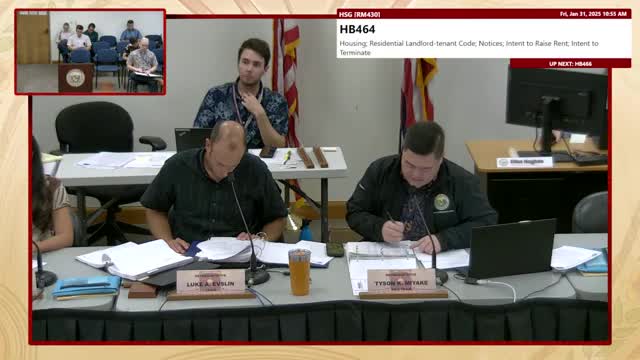Committee narrows eviction-record sealing, extends lease notice and advances no-fault eviction and foreclosure protections
Get AI-powered insights, summaries, and transcripts
Subscribe
Summary
Lawmakers advanced a set of tenant-related bills: they narrowed a proposal to seal eviction records automatically when tenants prevail (HB 463), added notice clarity for lease expiration (HB 464), modified a no-fault eviction bill (HB 466) and deferred foreclosure protections for additional drafting and possible CDFI exemptions (HB 467).
The House Committee on Housing advanced a group of tenant- and foreclosure-related measures, making substantive edits to narrow scope and address constitutional and implementation questions raised by the Attorney General and the judiciary.
On HB 463 (eviction records), the committee adopted a narrowed approach: records would be sealed automatically when a tenant prevails in an eviction case, but broader prohibitions on inquiries and a blanket sealing after two years were removed following AG and judiciary concerns about constitutional viability. Deputy Attorney General Christopher Hahn cautioned the panel about a 9th Circuit decision striking similar ordinances and recommended a severability clause. Medical Legal Partnership attorney Dasia Strauski testified that sealing records when tenants prevail would remove a major barrier to renters pursuing meritorious claims.
Maui Housing Hui, tenant organizers and legal aid groups supported the sealing provision, saying eviction records deter tenants from asserting legal rights even when their housing conditions warrant relief. Tenant organizer Jordan Hocker described sealing as a way to reduce displacement and discriminatory screening practices.
HB 464, which clarifies lease-notice obligations when term leases expire, was advanced with technical clarifications requested by the Attorney General; supporters said clearer rules would help renters and landlords plan in a thin rental market. The panel adopted AG-suggested savings language to avoid impairing existing contracts in a way that would violate the state or federal constitution.
On HB 466, a no-fault eviction bill designed to stabilize communities after disasters, the committee narrowed some categories that had been in the original draft, removed certain provisions that did not fit the legislative definition of no-fault, shortened the required notice period from 90 to 60 days in several provisions, and clarified relocation assistance options (the landlord may either pay a relocation amount equal to one month’s rent or waive the final month’s rent). The AG suggested more precise definitions of “relocation assistance” to avoid ambiguity.
HB 467 (foreclosures), driven by concerns about post-disaster foreclosure pressure in Lahaina, was advanced with a deferral on a technical point: committee members asked staff to consider exempting certified community development financial institutions (CDFIs) from certain public-sale restrictions to enable local non‑profits to step in to acquire lands at auction and preserve local ownership. Testimony from Lahaina Strong and the Lahaina Community Land Trust stressed the urgency of enabling community groups to intervene as foreclosures resume following the end of a moratorium.
Committee members said the package reflects a balance: protecting tenants who prevail, tightening procedural clarity, and enabling community responses to foreclosures while trying to avoid constitutional exposure and implementation pitfalls.
Several bills were advanced with amendments and defective dates for further review.
